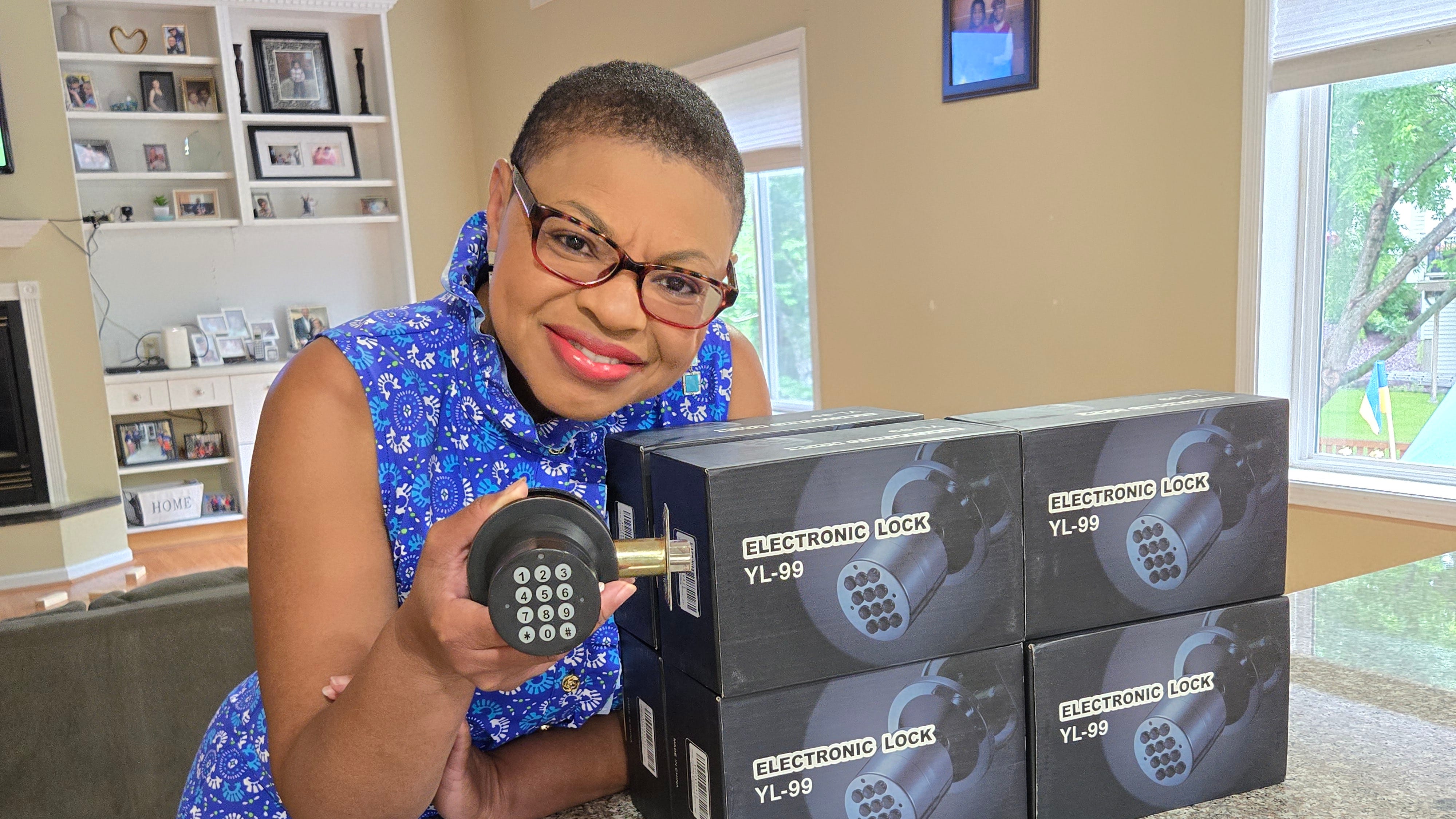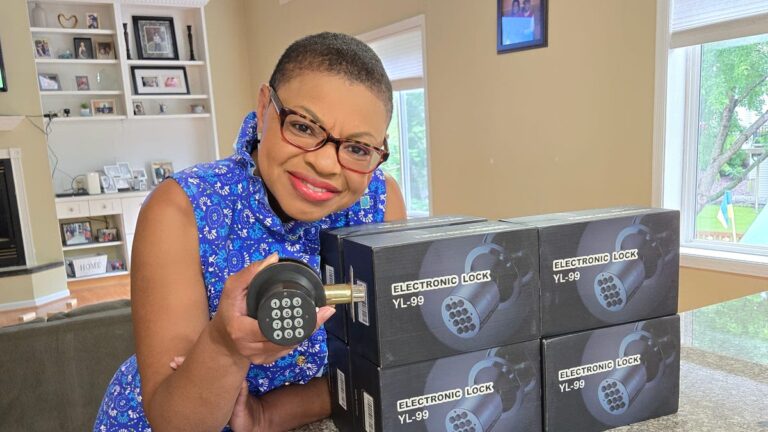
Watch this mom donate safety locks for families with autistic children
Sheletta Brundidge held a giveaway in Houston, Texas for families with children who have autism, donating specialized door locks to keep kids safe.
When Sheletta Brundidge found out Minnesota police had recovered the body of a missing 4-year-old boy who had autism, she knew she needed to go and support his family.
The boy, Waeys Ali Mohamed had been reported missing just a day earlier and police believe he wandered into a creek, where he drowned, according to television station KARE.
“I don’t want another child to drown,” she told USA TODAY Thursday afternoon. “I don’t want another mother to cry out. I don’t want another funeral for a little child who is nonverbal, who has autism, who has drowned.”
Autism is used to describe a range of conditions that include difficulty managing social skills, repetitive behaviors, speech and nonverbal communication, according to nonprofit Autism Speaks.
Brundidge is based in Cottage Grove, Minnesota, about 13 miles southeast of Saint Paul. Her oldest child, a boy, is 17 years old. Her three younger children have all been diagnosed with autism and are 9, 10 and 11.
Some autistic children have a tendency to wander off and can be drawn to water, not realizing it can be dangerous.
That’s why she started her own initiative called “Spread Love with Locks” to make sure parents in need have locks to keep their children safe. She has worked with police departments, YMCA locations and even Amazon to distribute the locks to families in need.
One of her upcoming giveaways will be in Sutton, Massachusetts, about 50 miles southwest of Boston. That’s where Eva, a 4-year-old autistic girl, drowned in a neighbor’s pool on July 11.
Read more: 4-year-old girl reported missing in Massachusetts found unresponsive in neighbor’s pool
Teaching autistic children about water safety
Drowning is one of the leading causes of injury-related deaths among children, especially those younger than 4 and teenagers. It’s even higher for autistic children, said Lindsay Naeder, vice president of services & supports at Autism Speaks.
“For children with autism, the risk of drowning is actually 160 times greater than the general child population,” she told USA TODAY Thursday afternoon, citing a study out of Columbia University. “Out of the dozens of cases that happen weekly, unfortunately, between 75 and 90% of wandering-related deaths are a result of drowning as well.”
She said autistic children often wander from safety. It’s also called “eloping from safety,” she said.
And according to a study published in the journal Pediatrics, nearly a third of wandering incidents occurred from a school setting.
Naeder said the organization surveyed families in the community and found that 50% of respondents had experienced wandering before.
And when children wander, they are often drawn to bodies of water, whether it’s a pool, the ocean, a lake, a drainage ditch, a water treatment plant or something else.
“The first lesson that’s taught around swim and water safety for the autism community is how to keep yourself out of water,” she said, adding that there are private groups and community organizations such as the YMCA and Swim Angelfish that specialize in working with children with special needs.
But sometimes private lessons can be costly, she said.
“Private lessons cost way more than open classes that are available to groups, so unfortunately, there is a paywall there in terms of access for families of those that do have more intensive support needs,” Naeder said.
‘Elopement’ Her boy wandered from home and died. This mom wants you to know the perils of ‘elopement.’
Mom recommends coded locks to keep autistic children from leaving the house
Any child can get away from their parents very quickly, so when Brundidge saw that her friend had a keypad lock on the front door of her new home, she wondered if any companies made them to be installed inside the home.
She checked a local store first to no avail. After that, she went to a few other stores and tried her luck with Amazon.
She thought about experiences she has had with her own children, including her son. That led her to buy four locks: one for her basement, one for the garage, one for an office and one for the front door.
The locks require a 6 to 10 digit code to open and also come with keys guardians can set aside, Brundidge said.
“When he tries to put that code in, he can’t,” she said. “He’s got like two or three times. It locks up, but it makes a beep. That lets me know he’s trying to get out of the house. Probably about a week after we installed those door locks, he stopped trying … We haven’t had an incident of him wandering in like two years.”
She often orders and donates the following products:
Tragedy: Body of autistic 3-year-old boy found after he went missing from resort near Disney
‘I’ve already done that work, why am I going to sit on that?’
Brundidge said finding resources for autistic children can be difficult. It can sometimes take a while to qualify for resources because you have to wait for an official diagnosis, she said.
She had to do a lot of digging to get help for her children and found scholarships, grants that will pay for therapy services that the insurance won’t cover, and more.
But while she was able to find resources for her children, it was quite the task, so she does all she can to make things easier on other parents.
She hosts free workshops for parents with special needs, helping parents find resources for their families. Now, people call her “The Autism Mom.”
She said everything she learned to help her children was passed onto her from other parents. She’s just doing her part, she said.
“If I’ve already done that work, why am I going to sit on that?” said Brundidge, who also has a multimedia online platform with weekly podcasts called SHElettaMakesMeLaugh.
“It’s my job to take that information and take those resources, and pass them onto the mama who’s working day and night and the father who is taking care of his autistic children.”
Autistic children come first at this mom’s events
Brundidge said at her events, there are also face painting stands, tattoos and balloons.
She wants to help families keep their children safe, yes, but she also wants to show families their children come first and they can have fun in a space that’s safe for them.
“Children with special needs are always last on the bus,” she said. “We are last in the lunchroom. Our children last on the playground. We’re the last to get to school and we’re always the last ones to leave. At my events, I want to make sure they know that they are first.”
She also stressed that it’s important for people to give autistic children and their parents grace.
Oftentimes, people see autistic children and assume they are just disobedient, Brundidge said.
“We have all these things in place, all this work we’re doing to try to keep our kids safe and still, stuff happens,” she said. “We’re doing the best we can. We’re doing everything we can and what we need is prayers and support, not judgment and condemnation.”
Saleen Martin is a reporter on USA TODAY’s NOW team. She is from Norfolk, Virginia – the 757. Follow her on Twitter at @SaleenMartin or email her at sdmartin@usatoday.com.
This article was originally published by a www.usatoday.com . Read the Original article here. .



